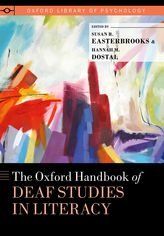The Oxford Handbook of Deaf Studies in Literacy
Temas
Detalles
The Oxford Handbook on Deaf Studies Series began in 2010 with it first volume. The series presents state-of-the-art information across an array of topics pertinent to deaf individuals and deaf learners, such as cognition, neuroscience, attention, memory, learning, and language. The present handbook, The Oxford Handbook of Deaf Studies in Literacy, is the fifth in the series, and it offers the most up-to-date information on literacy learning among deaf and hard-of-hearing (DHH) learners. Topic examined in this concise volume include the importance of language and cognition and the elements of phonological/orthographic awareness, morphosyntactic and vocabulary understanding, reading comprehension and classroom engagement, written language, learning among challenged populations, and the need to rethink our approaches to literacy research. With contributions from a well-known and highly respected field of educators and researchers, the volume will help all involved see the path each DHH child as an individual must follow if he or she is to unlock the vast world available when one has competence in reading comprehension. Too often, sweeping generalizations are made about all DHH readers—no matter their background, language(s), chosen modality(ies), and experience—from data on only a small segment of the overall population. Therefore, the editors collaborated with the authors to ensure that authors were clear about the research participants cited when making claims about specific subpopulations. This means readers can be relatively certain that statements made in this book about certain subpopulations in fact are based on data from those subpopulations.





